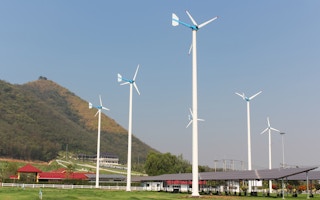Global momentum is building towards greater investment in renewables. Renewable energy is no longer seen as an indulgence that needs to be tolerated. Prospects are looking bright for the renewable energy industry as a growing number of countries, including the United States are realizing that the rapidly increasing use of renewable energy has become a beacon for optimism.
To continue reading, subscribe to Eco‑Business.
There's something for everyone. We offer a range of subscription plans.
- Access our stories and receive our Insights Weekly newsletter with the free EB Member plan.
- Unlock unlimited access to our content and archive with EB Circle.
- Publish your content with EB Premium.
In fact, renewable energy sources are becoming affordable thanks to enhanced infrastructure and policies. Over the next decades, huge investments will be flowing into the energy sector. It is critical to seek ways to green those investments. According to UNEP’s 9th “Global Trends in Renewable Energy Investment 2015,” renewables are growing rapidly in both developed and developing countries, with China leading the way.
China saw more than $83 billion in investments in renewables in 2014. The U.S. came in second worldwide, with about $38 billion in investments and Japan ranked third with nearly $36 billion. Investments in renewables totaled $131.3 billion in developing nations in 2014, up 36 percent over 2013.
A growing number of companies are realizing that renewables are the part of the energy sector with a long-term future. Solar and wind accounted for 92 per cent of all investment in renewable and fuels worldwide in 2014. Wind and solar sectors are highly likely to carry on flourishing.
Shifting towards renewables is a win-win for the environment and the economy. Small-scale renewables offer an efficient way to provide energy access to vast numbers of people living without power.
In fact, renewable energy can meet a number of objectives for developing nations by focusing on increasing energy access to their populations, improving poor air quality in cities by reducing emissions, enhancing sustainability of economic development and helping to move away from their fossil fuel energy reliance.
Main findings of the 2014 ‘Better Growth, Better Climate’ report show that about $90 trillion will be invested in infrastructure by 2030. Cooperative, multi-stakeholder partnerships can catalyze further ambition and action and generate economic benefits. The global level of ambition on climate change can be raised in economically beneficial ways.
Achieving a new international climate agreement in Paris provided a vital foundation for building a lower-carbon and more resilient global economy, sending a strong signal to businesses and investors. The Global Green Growth Institute (GGGI), a member-based international organization I serve as Director-General, can contribute to the post-Paris actions.
Intended Nationally Determined Contributions (INDCs), which are the main implementing instrument of the Paris Agreement, are a key area of GGGI’s service offerings. GGGI is developing a unique six-step model for deploying finance vehicles at the national level.
“
There are three critical elements to mobilize climate finance for developing countries: 1) building innovative financial instruments, 2) creating strong financial institutions and 3) developing green energy projects.
At present, we are working in Rwanda, Colombia, Senegal, Ethiopia and Philippines to establish and strengthen national finance vehicles through providing management support, linking the funds with INDCs and Sustainable Development Goals, developing a pipeline of projects that can be leveraged through the funds, supporting capitalization of funds, building capacity to manage and attracting private financing through de-risking of projects.
It is an illusion to think that solving climate change is just about mobilizing more money.
There are three critical elements to mobilize climate finance for developing countries: 1) building innovative financial instruments, 2) creating strong financial institutions and 3) developing green energy projects.
In the margins of the COP21 Paris climate summit in December last year, GGGI organized events to examine the importance of securing innovative international finance, developing national instruments and bankable projects and mobilizing green financing in developing countries to help them to transition to low emission and climate resilient economies.
What GGGI can offer is technical expertise to assist Multilateral Development Banks to identify green growth opportunities and investments by working closely with emerging economies and Least Developed Countries (LDCs). GGGI can support the implementation of the Paris commitments through bankable projects and by building domestic green finance institutions.
Scaling up climate finance for developing countries remains important.
First, developed countries need to take steps to show commitments to support developing and emerging countries through public finance. Greater emphasis needs to be placed on using public finance institutions to leverage private capital and build policy incentives for directing private finance to developing countries. International financial institutions also need to take collective action.
They need to make unified efforts to create an investment-conducive environment for poorer countries, develop capacity building and knowledge sharing programs, establish development and education strategies and provide incentive-based governance mechanisms to attract investors.
Second, increasing political commitment to environmental issues is crucial. It is important for governments to realize that the transition to a green pathway is becoming financially viable and there is a need to provide frameworks for green growth that can lower policy uncertainties.
Third, the technology, at present, is not making its way into the market to effectively assist developing countries. This is partly because the costs are too high, the risks are too great or the markets are too small. These are a set of challenges faced by investors. It is important to foster a favorable policy environment for investors.
Last, it is critical to develop bankable project proposals that translate environmental propositions into a comprehensive language for investors and take those proposals to the financial institutions that will finance project implementation.
Looking ahead, many would agree that renewable energy is the future and that future looks very green. At the 2015 Paris climate change conference, the world vowed to reduce emissions and invest more in renewables. Now actions need to be taken to find realistic ways to green investments and mobilize finance.
Yvo de Boer is Director-General of the Global Green Growth Institute (GGGI). This piece was written exclusively for Eco-Business.











